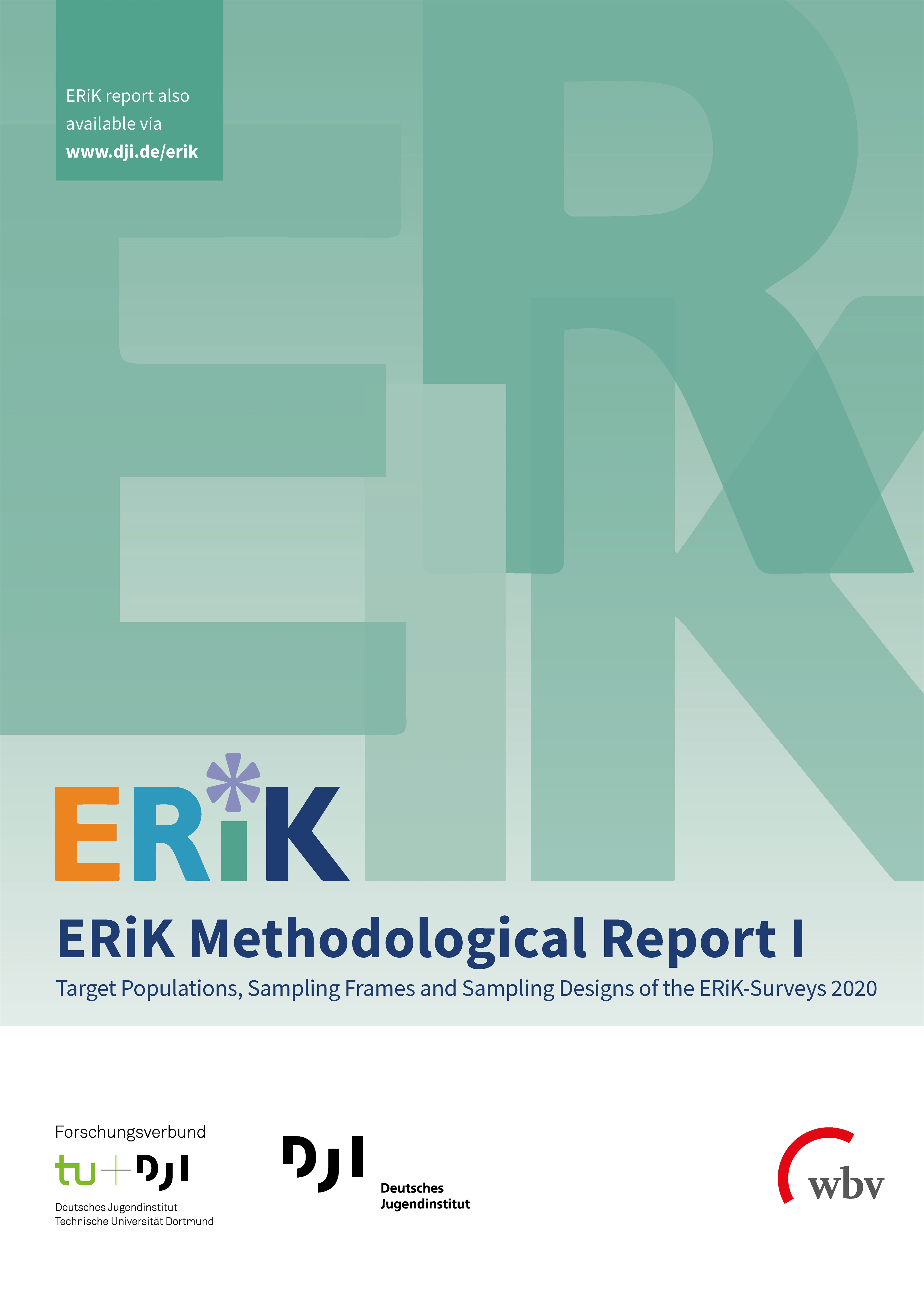ERiK Methodological Report I
Target Populations, Sampling Frames and Sampling Designs of the ERiK-Surveys 2020
The ERiK Methodological Report I provides information on the methodological concepts of seven ERiK-Surveys on the quality of child day-care in Germany. These surveys include the five ERiK-Surveys 2020 and the parent survey, which was implemented in 2019 as part of the KiBS project, as well as the survey of children in day-care, set to be conducted in 2022.
This method report introduces the seven distinct target populations of these surveys: youth welfare offices, family day-care workers, providers of childcare, directors of day-care centres, pedagogical staff in these centres, parents and children aged 4 to 6 attending day-care centres. Sampling frames for these target populations and their coverage in relation to the population are discussed.
In addition, the sampling designs for the different target populations are introduced. The ERiK-Surveys 2020 of youth welfare offices and providers of childcare were complete population surveys. Stratified random samples (for directors) and stratified two-stage cluster samples were developed for the populations to which direct access was not possible (pedagogical staff and family day-care workers).
Furthermore, the fieldwork results and response rate are included for the parents survey as part of the long-running DJI project KiBS, which included ERiK-specific questions for the first time in 2019.
The ERiK-Surveys at the German Youth Institute (DJI) provide the basis for the introduction of a new monitoring system for early childhood education and care in Germany. The monitoring of the development of framework conditions in the day care system (in German: Entwicklung von Rahmenbedingungen in der Kindertagesbetreuung (ERiK)) is anchored in the "Act on the Further Development of Quality and the Improvement of Participation in Day-Care Facilities and in Child Day-Care (KiQuTG)".
This method report introduces the seven distinct target populations of these surveys: youth welfare offices, family day-care workers, providers of childcare, directors of day-care centres, pedagogical staff in these centres, parents and children aged 4 to 6 attending day-care centres. Sampling frames for these target populations and their coverage in relation to the population are discussed.
In addition, the sampling designs for the different target populations are introduced. The ERiK-Surveys 2020 of youth welfare offices and providers of childcare were complete population surveys. Stratified random samples (for directors) and stratified two-stage cluster samples were developed for the populations to which direct access was not possible (pedagogical staff and family day-care workers).
Furthermore, the fieldwork results and response rate are included for the parents survey as part of the long-running DJI project KiBS, which included ERiK-specific questions for the first time in 2019.
The ERiK-Surveys at the German Youth Institute (DJI) provide the basis for the introduction of a new monitoring system for early childhood education and care in Germany. The monitoring of the development of framework conditions in the day care system (in German: Entwicklung von Rahmenbedingungen in der Kindertagesbetreuung (ERiK)) is anchored in the "Act on the Further Development of Quality and the Improvement of Participation in Day-Care Facilities and in Child Day-Care (KiQuTG)".
1 The German System of Early Childhood Education and Care
2 Objectives of the Study
3 Target Population
3.1 Youth Offices
3.2 Family Day-Care Persons
3.3 Providers of Childcare
3.4 Directors of Day-Care Centres
3.5 Pedagogical Staff at Day-Care Centres
3.6 Parents of Children in Day-Care
3.7 Children in Day-Care
4 Sampling Frame
4.1 Sampling Frame of Youth Offices
4.2 Sampling Frame of Family Day-Care Persons
4.3 Sampling Frame of Providers of Childcare
4.4 Sampling Frame of Directors and Pedagogical Staff at Day-Care Centres
4.5 Sampling Frame of Parents with Children in Day-Care
4.6 Sampling Frame of Children in Day-Care
5 Sampling Designs
5.1 Sampling Design for Youth Offices and Family Day-Care Persons
5.2 Sampling Design for Providers of Childcare
5.3 Sampling Design for Directors and Pedagogical Staff at Day-Care Centres
5.4 Sampling Design for Parents of Children in Day-Care
5.5 Sampling Design for Children in Day-Care
6 Fieldwork Results and Response Rates
6.1 Parent Survey
Bibliography
2 Objectives of the Study
3 Target Population
3.1 Youth Offices
3.2 Family Day-Care Persons
3.3 Providers of Childcare
3.4 Directors of Day-Care Centres
3.5 Pedagogical Staff at Day-Care Centres
3.6 Parents of Children in Day-Care
3.7 Children in Day-Care
4 Sampling Frame
4.1 Sampling Frame of Youth Offices
4.2 Sampling Frame of Family Day-Care Persons
4.3 Sampling Frame of Providers of Childcare
4.4 Sampling Frame of Directors and Pedagogical Staff at Day-Care Centres
4.5 Sampling Frame of Parents with Children in Day-Care
4.6 Sampling Frame of Children in Day-Care
5 Sampling Designs
5.1 Sampling Design for Youth Offices and Family Day-Care Persons
5.2 Sampling Design for Providers of Childcare
5.3 Sampling Design for Directors and Pedagogical Staff at Day-Care Centres
5.4 Sampling Design for Parents of Children in Day-Care
5.5 Sampling Design for Children in Day-Care
6 Fieldwork Results and Response Rates
6.1 Parent Survey
Bibliography
weitere Infos
Schacht, Diana D.; Gedon, Benjamin; Gilg, Jakob J.; Klug, Christina; Kuger, Susanne (2021). ERiK Methodological Report I: Target Populations, Sampling Frames and Sampling Designs of the ERiK-Surveys 2020 (1. ed.). Bielefeld. wbv Publikation. https://doi.org/6004863w
